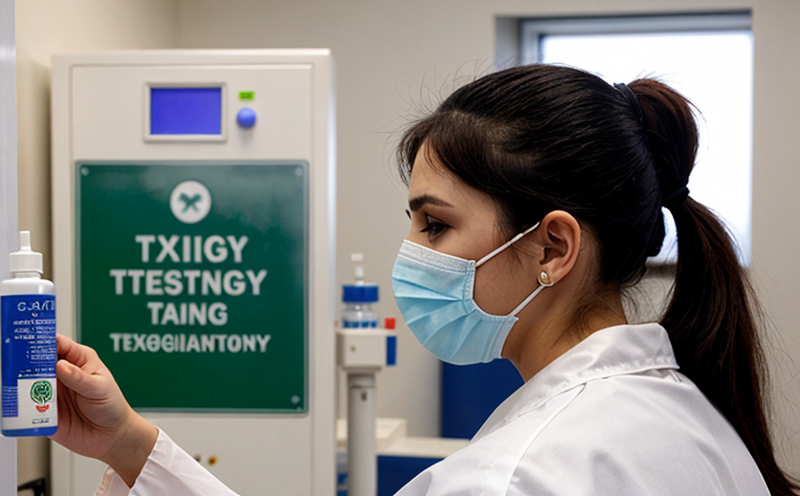Immunotoxicity Cytokine Release Assay Testing
The Immunotoxicity Cytokine Release Assay (CRA) is a pivotal tool in the pharmaceutical industry, designed to evaluate potential immunotoxic effects of new drug candidates. This test assesses whether a compound can induce an abnormal immune response that could lead to adverse reactions in patients.
Immunotoxicity is a critical concern during preclinical and clinical development phases as it can significantly impact therapeutic efficacy and patient safety. The CRA provides insights into how a substance interacts with the body's immune system, helping researchers identify potential risks early in the development process. This information is crucial for ensuring that new drugs are both effective and safe.
The assay involves exposing cells to test compounds under controlled conditions, followed by the measurement of cytokines released from activated immune cells. Cytokines play a vital role in coordinating immune responses, and their uncontrolled release can indicate an imbalance in the immune system. By quantifying these cytokines, the CRA allows for a detailed assessment of the compound's impact on various aspects of the immune response.
The test is conducted using advanced laboratory techniques that ensure precision and reliability. Key components include the selection of appropriate cell lines, optimization of assay conditions, and rigorous quality control measures to minimize variability. The use of standardized protocols based on international guidelines ensures consistency across different laboratories.
The primary goal of this service is to provide clients with comprehensive data that can inform critical decisions regarding drug safety and efficacy. By identifying potential immunotoxic risks early in the development process, pharmaceutical companies can avoid costly delays and potential regulatory issues later on.
Moreover, the CRA is essential for aligning with global regulations aimed at ensuring product safety. Regulatory bodies such as the FDA, EMA, and WHO have emphasized the importance of robust immunotoxicity assessments to safeguard public health. Adherence to these standards not only enhances the credibility of a drug candidate but also facilitates smoother approval processes.
Recent advancements in biotechnology have further improved the CRA's capabilities. For instance, the use of next-generation sequencing technologies allows for more comprehensive analysis of cytokine profiles, providing deeper insights into immune responses. Additionally, automation has enhanced efficiency and reduced human error, making the process faster and more reliable.
To ensure accuracy and consistency, Eurolab employs a team of highly skilled scientists who are well-versed in conducting CRA tests according to stringent industry standards. Our facilities are equipped with state-of-the-art instruments capable of detecting even minute changes in cytokine levels. This precision is crucial for identifying subtle yet significant effects that might otherwise go unnoticed.
Sample Preparation and Assay Protocol
The sample preparation process for the CRA involves several key steps. First, appropriate cell lines are selected based on their relevance to the intended therapeutic application. These cells are then cultured under controlled conditions before exposure to test compounds. The duration and concentration of compound exposure are carefully optimized to simulate realistic scenarios.
- Selection of cell lines relevant to the drug’s target
- Culture of cells in standardized media
- Exposure to varying concentrations of test compounds
- Measurement of cytokine levels using ELISA or multiplex arrays
The assay protocol typically involves a series of steps, including cell activation, compound addition, incubation periods, and final cytokine quantification. Each step is meticulously planned to ensure optimal results. Post-assay data analysis utilizes sophisticated software tools that help in interpreting complex biological signals accurately.
Benefits
The benefits of the Immunotoxicity CRA testing are numerous and far-reaching, particularly for pharmaceutical companies focused on developing safe and effective therapies. One significant advantage is the early detection of potential immunological issues, which can prevent costly delays in clinical development.
- Reduces the risk of adverse reactions
- Enhances product safety profiles
- Aids in regulatory compliance and approval
- Promotes patient confidence through robust safety data
By providing detailed insights into how test compounds interact with the immune system, the CRA helps companies make informed decisions about drug development. This information is invaluable for optimizing formulations and identifying any necessary modifications to improve safety.
The use of advanced technologies in our laboratory ensures that clients receive accurate and reliable data. This accuracy contributes directly to improved decision-making processes within pharmaceutical organizations, ultimately leading to better outcomes for both patients and the industry as a whole.
Eurolab Advantages
At Eurolab, we pride ourselves on offering top-tier services that meet the highest standards of quality and reliability. Our expertise in conducting Immunotoxicity CRA testing is just one example of how we go above and beyond to support our clients.
- State-of-the-art facilities equipped with cutting-edge technology
- A team of highly qualified scientists specializing in immunology and toxicology
- Comprehensive quality control measures ensuring consistent results
- Adherence to international standards like ISO, OECD, and FDA guidelines
We understand the importance of precision and accuracy in drug development. That’s why we invest heavily in maintaining our facilities and continuously updating our methodologies based on the latest scientific advancements. Our commitment to excellence ensures that every client receives the best possible service.
Environmental and Sustainability Contributions
- We minimize waste by recycling used reagents and disposables
- Implement energy-efficient practices in laboratory operations
- Participate in community programs focused on environmental education





